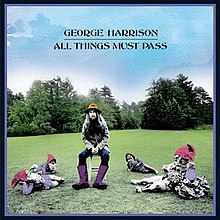All Things Must Pass
| All Things Must Pass | ||||
|---|---|---|---|---|
 |
||||
| Studio album by George Harrison | ||||
| Released | 27 November 1970 | |||
| Recorded | 26 May–late October 1970 | |||
| Studio | Abbey Road Studios, London; Trident Studios, London; Apple Studio, London | |||
| Genre | ||||
| Length | 105:59 | |||
| Label | Apple | |||
| Producer | George Harrison, Phil Spector | |||
| George Harrison chronology | ||||
|
||||
| Singles from All Things Must Pass | ||||
|
||||
| Alternative cover | ||||

Album artwork of the 2001 re-release of All Things Must Pass
|
||||
| Professional ratings | |
|---|---|
| Review scores | |
| Source | Rating |
| AllMusic | |
| Blender | |
| Christgau's Record Guide | C |
| Encyclopedia of Popular Music | |
| Mojo | |
| MusicHound Rock | 5/5 |
| Pitchfork | 9.0/10 |
| Q | |
| Rolling Stone | |
| Uncut | |
All Things Must Pass is a triple album by English musician George Harrison. Recorded and released in 1970, the album was Harrison's first solo work since the break-up of the Beatles in April that year, and his third solo album overall. It includes the hit singles "My Sweet Lord" and "What Is Life", as well as songs such as "Isn't It a Pity" and the title track that had been turned down for inclusion on releases by the Beatles. The album reflects the influence of Harrison's musical activities with artists such as Bob Dylan, the Band, Delaney & Bonnie and Billy Preston during 1968–70, and his growth as an artist beyond his supporting role to former bandmates John Lennon and Paul McCartney. All Things Must Pass introduced Harrison's signature sound, the slide guitar, and the spiritual themes that would be present throughout his subsequent solo work. The original vinyl release consisted of two LPs of songs and a third disc of informal jams, titled Apple Jam. Several commentators interpret Barry Feinstein's album cover photo, showing Harrison surrounded by four garden gnomes, as a statement on his independence from the Beatles.
Production began at London's Abbey Road Studios in May 1970, with extensive overdubbing and mixing continuing through October. Among the large cast of backing musicians were Eric Clapton and Delaney & Bonnie's Friends band – three of whom formed Derek and the Dominos with Clapton during the recording – as well as Ringo Starr, Gary Wright, Preston, Klaus Voormann, John Barham, Badfinger and Pete Drake. The sessions produced a double album's worth of extra material, most of which remains unissued.
...
Wikipedia
